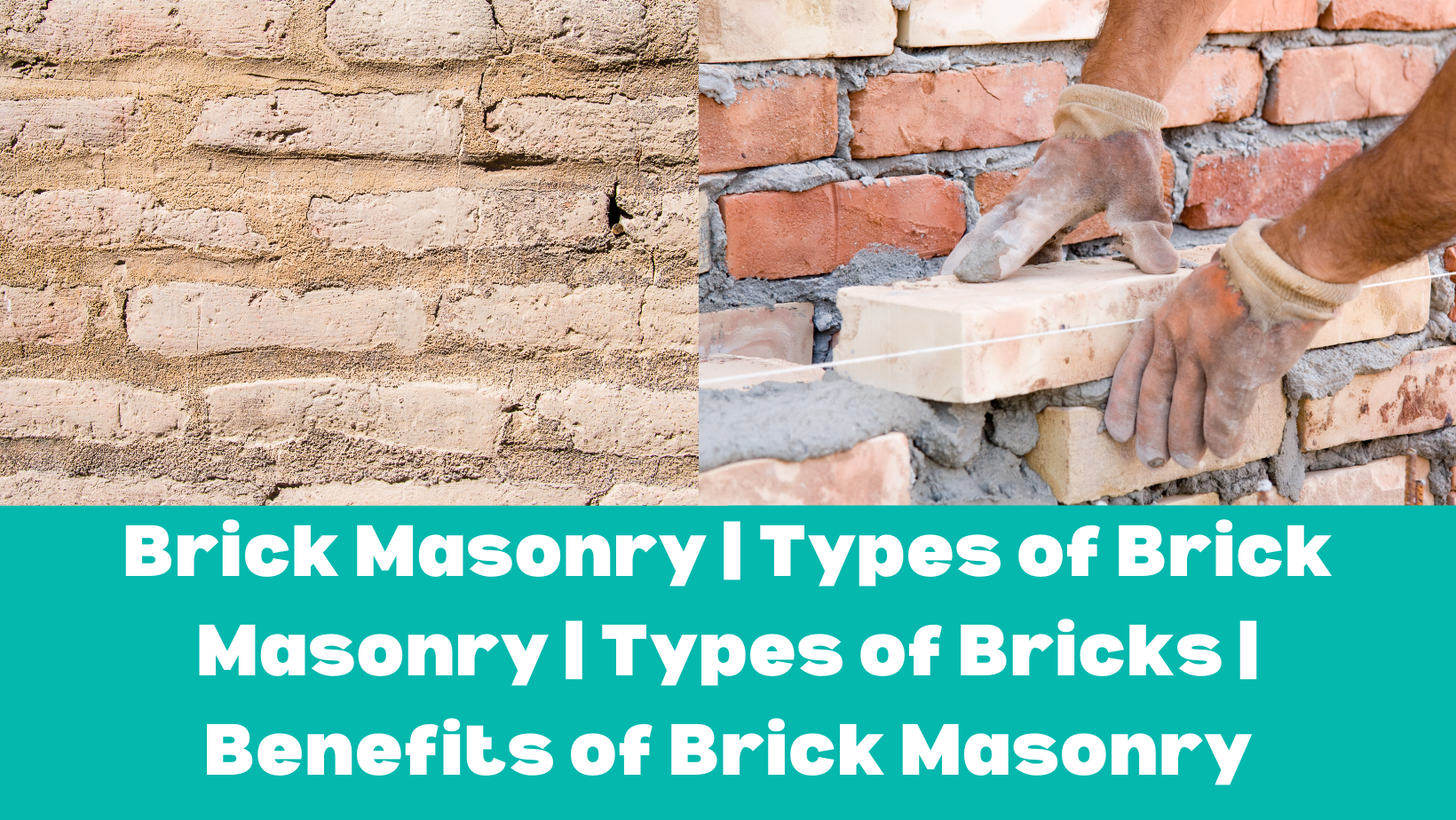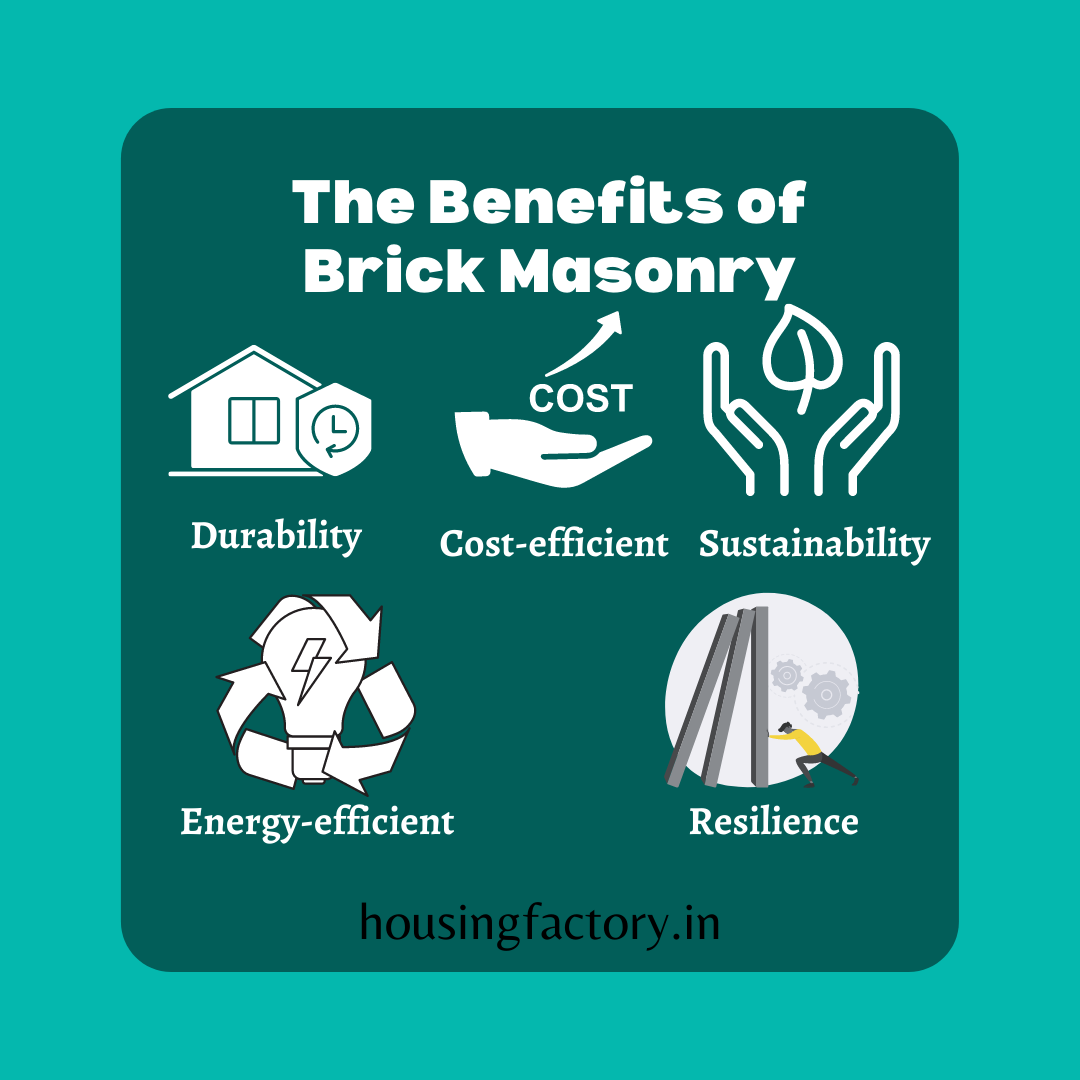Everything about brick masonry-Types of brick masonry, benefits, and types of bricks

Introduction
The art of brick masonry has been around for thousands of years. Still, it is a popular choice in home construction today. While it may be an ancient building method, brick is still an incredibly efficient option for constructing houses.
The construction of brick homes requires less energy than constructing a home with other materials. Brick is a durable material. It requires much less upkeep than other materials, which means almost no maintenance at all.
The durability and resilience that brick offers and its versatility in design makes it an excellent choice—whether you're building a house from the ground up or just looking to give your home a minor facelift.
What is brick masonry?
Brick masonry is a construction technique of systematically stacking bricks with mortar to erect buildings. Brick is one of the most efficient, durable, and commonly used building materials.
Besides efficiency and durability, brick masonry is an easier construction method. From the construction process to the maintenance of the house, brick masonry offers multiple benefits for the residents.
Benefits of brick masonry :

- Durability and resilience
- Energy efficient
- Cost-effective
- Brick is durable: Brick masonry protects your home from damage from weather, fire, insects, and other potentially destructive forces. As a result, you won't have to spend money on repairs and upkeep nearly as often as with other materials.
- Brick retains its value: Because brick walls are so durable and long-lasting that they help preserve the overall value of your home over time. And if you ever want to sell your house, you are more likely to get back more than what you paid for it because it was built with brick. So yes, there is a possibility.
- Brick is easy to maintain: Unlike other materials like wood or metal, which require frequent treatment to keep them in good condition, brick masonry holds up well. As a result, it's unlikely that you have to worry about doing any significant repair work after your house has been built.
- Sustainable
If you're looking to build a lasting structure, brick masonry is the way to go. Brick Masonry can be used in building structures that are designed to last for centuries.
While brick might not look as flashy as other materials, it's skillfully crafted and versatile enough to support almost any design. Brick is also more durable than other building materials. It's resistant to floods, earthquakes, and fires. Plus, unlike wood or plastic, it doesn't rot away or melt.
Additionally, brick has a natural resistance to pests like termites and ants that can destroy your home if left unchecked for too long. So if at all there is an unexpected infestation in your house (or apartment complex), it would be easier to get rid of these bugs with bricks instead of replacing everything from floor joists up!
Brick masonry is also more energy-efficient than other types of materials used in construction. It blocks out heat and cold better than many other construction materials. This means less energy will be used for heating and cooling the home throughout the year - saving you money on your utility bills.
You have probably never thought about the cost of masonry. But if you are in the market for a new home, the type of material used can make a big difference in your housing budget.
Many homeowners may not realize that brick masonry is one of the most cost-effective building materials. Some of the reasons for this include:
There's a lot of pressure to build quickly and cheaply in the current house construction industry. Often with new construction, this means using lightweight materials (like concrete) and leaving out important details like insulation. But fast and cheap doesn't always mean high quality! For instance, houses built with brick masonry are more sustainable than other houses because they last longer, require less maintenance and replacement, perform better in natural disasters, use less energy for heating and cooling, don't contain toxic materials like asbestos, and have a smaller carbon footprint.
Talk to our Experts
Types of bricks
- Common burnt clay bricks
- Concrete bricks
- Sand lime bricks
- Fly ash clay brick
Burnt clay bricks are used in construction of buildings. They are made from clay formed and then fired in a kiln at high temperature. The manufacturing process involves mixing, molding, drying, and firing the clay. There are different types of burnt clay bricks, including standard burnt clay bricks, first-class burnt clay bricks, second-class burnt clay bricks, and third-class burnt clay bricks.
First-class bricks are of the highest quality. They are dense and uniform in color with a smooth surface with very few cracks or flaws. Second-class clay bricks are similar to first-class but have more cracks and flaws. Third-class burnt clay bricks have the most cracks and flaws, but they still have enough structural integrity for some construction applications.
Common burnt clay bricks do not meet any quality standards but can be used for walls where appearance doesn't matter as much as strength.
Concrete brick is a brick made of concrete. It is made with sand, cement, and water. Concrete bricks are used in foundations, walls, other parts of buildings, sidewalks and streets. They can also be used to make decorative fences and garden paths.
Concrete bricks are often more affordable than clay bricks—they're also often lighter, making them easier to transport and handle. However, concrete bricks are not as strong or durable as clay bricks. They're not likely to shatter or crack easily. Still, they can crumble or erode over time. Concrete bricks may also have a duller look than clay ones.
Some concrete bricks are designed to look like stone or clay—these bricks receive a surface coat that makes them appear new even when they're old. However, this coating may inhibit their ability to absorb water, making them prone to cracking in colder temperatures if the water inside freezes.
A sand-lime brick is a building material commonly known as calcium silicate brick. It is made by mixing sand, fly ash and lime and followed by a chemical process during which the mixture is cast into bricks. The products are mainly used in applications where conventional clay bricks cannot be used in the building industry.
A fly ash clay brick is a building material that uses gypsum, sand, and fly ash as its main ingredients. Fly ash is a by-product of coal combustion, so it's an environmentally-friendly alternative to using other materials.
Fly ash bricks are commonly used in commercial construction because they're durable and require low maintenance. In addition, they can be made in a variety of colours, which makes them easy to use for a wide range of architectural needs.
Types Of Masonry
- Brick masonry with mud
- Brick masonry with cement
- The bricks chosen are superior in quality, with sharp edges and surfaces to avoid gaps.
- The thickness of mortar joints is constantly maintained at 10mm.
- Bricks used in second class brick masonry with cement are slightly irregular, but the edges are still sharp.
- The thickness of mortar joints is constantly maintained at 12mm
- This method is used for temporary buildings or constructions
- These structures cannot withstand harsh weather conditions.
- Bricks are a bit distorted in shape.
In this brick masonry method, mud is used as a binding material to construct walls, foundations, and house structures. However, brick masonry with mud is a pretty old technique. In addition, it is not as efficient and durable.
This method is not practical or appropriate for larger buildings. In addition, houses built with this method cannot withstand harsh weather conditions or are not durable enough.
Although brick masonry with mud is relatively affordable, walls taller than 4m do not stand firm on their own due to lack of strength in the binding material.
In Brick masonry with cement, mortar cement is used as the binding material rather than mud. As a result, it provides greater strength and durability than other materials.
Brick masonry with cement is the most commonly used construction technique in contemp orary building construction processes. The thicker consistency of mortar and higher water-to-cement ratio makes it highly adhesive. Hence, it is an efficient bonding agent for bricks or tiles.
| class | Brickwork |
|---|---|
| First-class | |
| Second-class | |
| Third-class |
Conclusion
Brick masonry is probably the most common form of masonry you will encounter. It is among the oldest and most efficient methods currently used to build houses. Brick masonry is cost-effective, highly durable, and many feel that it looks better than other forms of masonry.
In the end, brick masonry is not only a more efficient choice for high-quality construction, but it's easier to implement on-site. So whether you're laying bricks on a big project or just creating a few small spaces, brick masonry should be considered instead of other methods.
#Experienced Architects #Design #2D-Design #3D-Design #Construction Company #Housing-Factory #Build-Home #Residential-Projects #Interiors #Bangalore #BBMP #BDA #BMRDA #Panchayat #STRR #Municipality-Permission #A-Katha #B-Katha #Plan-Approval #Building-License #Hassle-Free #Contractor #Bescom #temporary electric connection #permanent Bescom Electrical connection
Hire the best construction service
Office Location:
Epic Housing Factory Pvt Ltd.
3rd floor, Novel Tech Park,
Kudlu Gate, Hosur road
Bengalore-560068
Connect to us:
Call : +91 6360759762 Email:contact@housingfactory.in
© 2021 housingfactory.in All rights reserved
